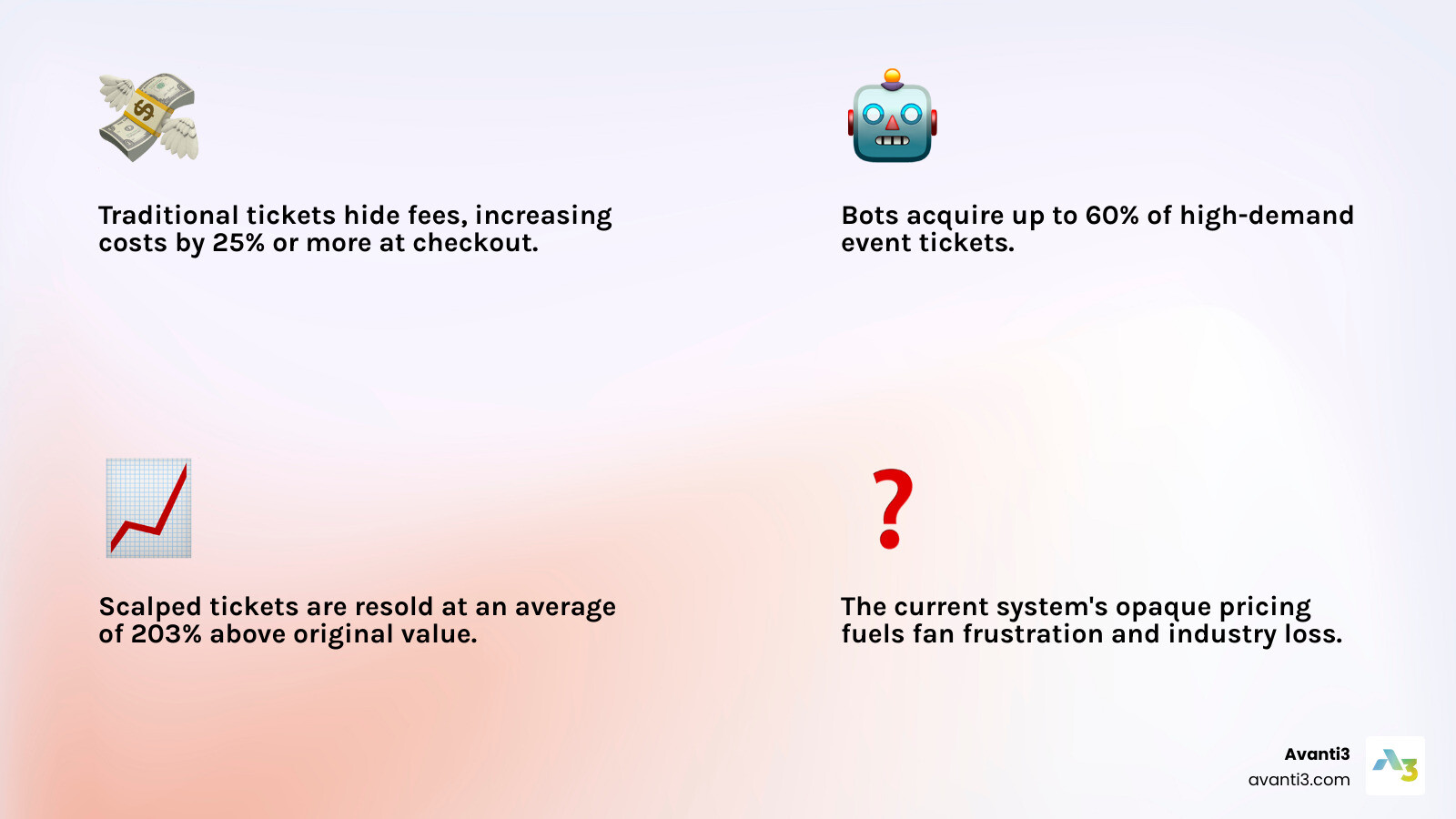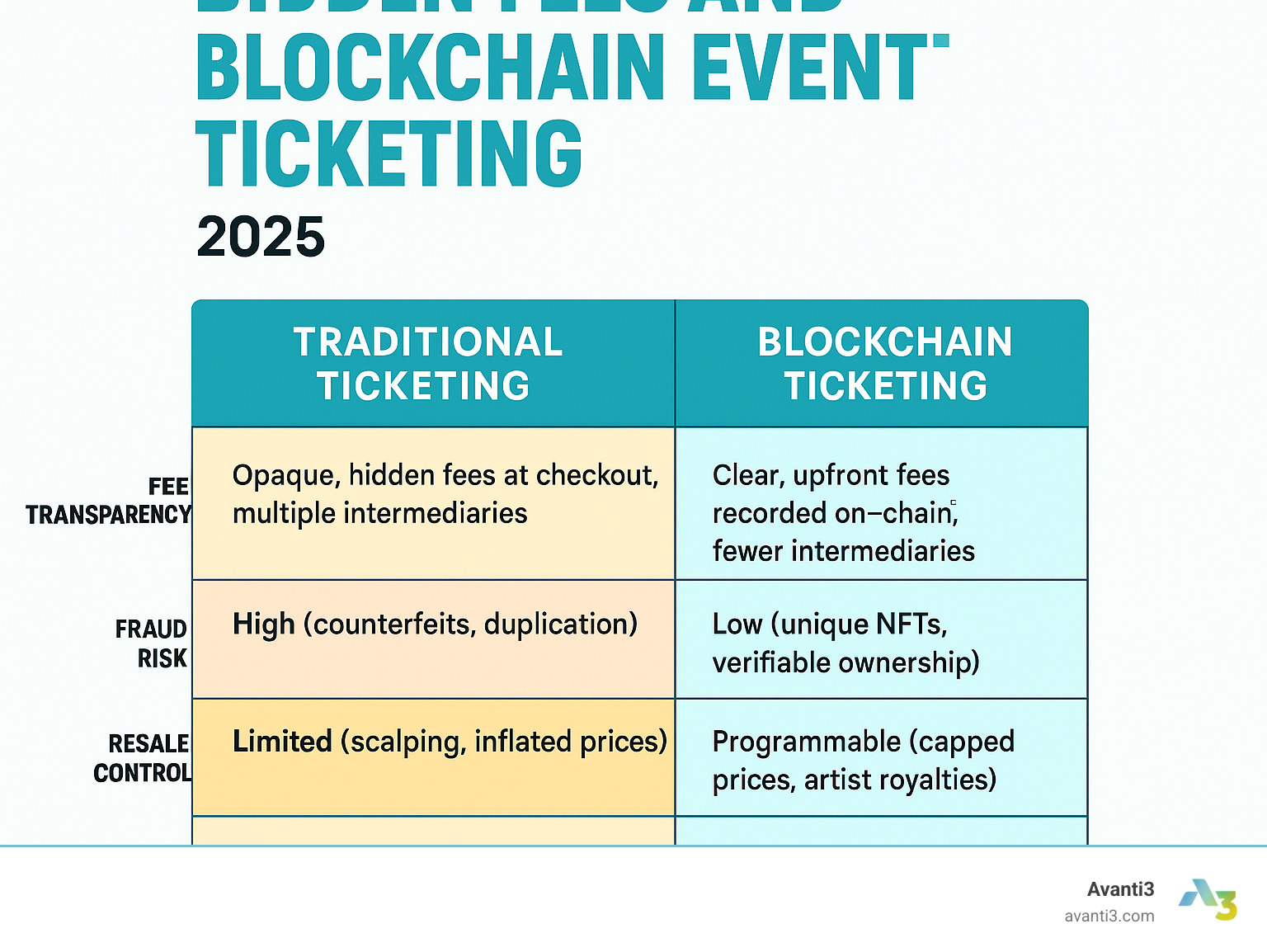Hidden fees and blockchain and event ticketing and transparency 1 End!
The End of the Hidden Fee Era
Hidden fees and blockchain and event ticketing and transparency represent a fundamental shift from the predatory pricing that has plagued the events industry. The solution is blockchain technology, which eliminates intermediaries, creates immutable price records, and uses smart contracts to prevent surprise fees at checkout.
Quick Answer for Hidden Fees and Blockchain Event Ticketing:
- Traditional Problem: Service fees up to 25%, processing fees, facility fees, and delivery charges
- Blockchain Solution: Transparent pricing through immutable ledgers and smart contracts
- Real Impact: UEFA EURO 2020 distributed 1M+ fraud-free tickets with full price visibility
- Fan Benefits: True ticket ownership, fair resale markets, and no surprise checkout fees
We’ve all felt the frustration of watching a $300 ticket balloon to $400 or more at checkout. This isn’t just annoying—it’s systematic.
Bots buy up to 60% of high-demand tickets, reselling them at an average of 203% of their original value. Meanwhile, traditional platforms take cuts up to 25% while adding hidden fees that only appear at the final checkout.
The current system is broken, but blockchain offers a path forward.
By creating immutable records of every transaction and using smart contracts to automate fair pricing, blockchain eliminates the opacity that allows hidden fees to flourish. When all costs are permanently recorded on a public ledger, there’s no room for surprise charges.
I’m Samir ElKamouny AV, and I’ve spent years in digital engagement and monetization. Through my work, I’ve seen how hidden fees and blockchain and event ticketing and transparency can transform the relationship between artists and their audiences.

The Broken System: Why Traditional Ticketing Is Failing Fans and Creators

Have you ever felt like you’re racing robots for tickets? You probably are. The traditional ticketing industry is plagued by fundamental flaws that frustrate fans and hurt artists, including scalping, counterfeit tickets, and a lack of control for everyone but the middlemen.
This isn’t a minor inconvenience; it’s a multi-billion-dollar problem. When bots snatch up tickets or fans buy fakes, it erodes trust in live events. The platforms themselves contribute with opaque pricing and hefty service fees that leave everyone confused.
The Problem: Unpacking Hidden Fees and the Lack of Transparency in Traditional Event Ticketing
Let’s talk about hidden fees. You see a ticket price, add it to your cart, and then a flurry of extra charges inflates the final cost. A $300 ticket can easily become $400 or more.
These fees are substantial. Traditional platforms can take cuts of over 25% through a combination of charges:
- Service Fees (or Convenience Fees): The catch-all for “platform maintenance” and “customer support.”
- Platform Fees: For the privilege of using the ticketing platform’s tools.
- Booking Fees: To process each transaction.
- Credit Card Processing Fees: For handling secure credit card transactions.
- Facility Fees: Often charged by venues, but sometimes “pocketed” by the ticketing company.
- Delivery Fees: Even for digital tickets!
Why are these fees so high and opaque? Market dominance and a lack of competition are key factors. When a few major players control the market, they have little incentive for transparency. Exclusive deals between ticketing companies and venues often include kickbacks from fee revenue, creating a frustrating ecosystem. Numerous industry reports detail how these hidden charges compound, leaving consumers feeling swindled.
How Scalping and Fraud Hurt Everyone
Beyond hidden fees, the traditional landscape is a playground for scalpers. Bots buy up to 60% of high-demand tickets in seconds, which then reappear on resale sites at an average of 203% of their original value. This is predatory. While laws like The BOTS Act exist, enforcement struggles to keep up.
Counterfeit tickets are another menace. Fans arrive at venues only to be denied entry with a fake ticket—a heartbreaking experience. For organizers and artists, it means lost revenue, damaged reputations, and a breakdown of trust. This undermines Digital Fan Engagement and creates a cycle of frustration and exploitation.
How Blockchain and Transparency Combat Hidden Fees in Event Ticketing
Imagine clicking “buy ticket” and paying the price you see—no surprises. This isn’t wishful thinking; it’s what hidden fees and blockchain and event ticketing and transparency can deliver.
Think of blockchain as a tamper-proof public ledger. Combined with smart contracts and NFTs, it transforms ticketing into a transparent system where fairness is programmed in. The contrast is stark: traditional ticketing hides fees, while blockchain puts everything in the open. Fee transparency becomes the norm, fraud risk drops to near zero with NFTs, resale is controlled via smart contracts, and fans own their data.

The Solution: Achieving Total Transparency with Blockchain and Event Ticketing
The immutable ledger tracks every step of a ticket’s journey in real-time, from creation to purchase to resale. This transaction history is public and cannot be altered, so there are no more mystery fees. Every cost is permanently recorded for anyone to verify.
By cutting out middlemen, blockchain creates more direct connections between artists and fans, which means lower costs and more money for creators.
Enter Non-Fungible Tokens (NFTs). An NFT ticket is a unique digital identity that’s impossible to duplicate, like a digital fingerprint. This verifiable ownership provides absolute confidence that your ticket is real, applying the same principles as Blockchain Art Authentication to events.
Using Smart Contracts to Automate Fairness and Control
The real game-changer is smart contracts: automated, self-executing rules written in code.
To stop scalping, smart contracts can cap resale prices automatically. To ensure artists benefit from the secondary market, they can automate royalty splits for artists on every resale. If an event is cancelled, automated refunds kick in immediately.
The results are clear: platforms using this technology are reducing fraud losses by 50%. This level of automation is revolutionizing Blockchain Content Distribution.
Real-World Proof: The UEFA EURO 2020 Case Study
For EURO 2020, UEFA distributed over 1 million tickets for 51 matches using blockchain.
Fans used a familiar mobile app with QR codes and Bluetooth activation backed by blockchain. The technology was invisible to the user, requiring no special crypto knowledge.
The results? Fraud elimination at a massive scale. With zero counterfeit tickets, the system provided security for over a million fans, ensuring every ticket was authentic. This case study proves blockchain ticketing is ready for prime time, improving Digital Experience Design while maintaining a user-friendly experience.
Opening Up New Value: The Benefits of Blockchain Ticketing for Everyone

Blockchain ticketing isn’t just about fixing problems; it’s about creating new possibilities. It’s like upgrading from a flip phone to a smartphone—you open up a new world of experiences. Blockchain creates fresh opportunities for everyone: fans get extended experiences, artists tap into new revenue streams, and everyone benefits from deeper connections.
For Fans: Fair Prices, Real Ownership, and Unique Experiences
For too long, fans have gotten the short end of the stick. Blockchain ticketing puts them back in control.
Guaranteed authenticity via unique NFT tickets means no more worrying if your ticket is real at the gate. With no hidden fees, checkout is a breeze. Transparent pricing on the blockchain means what you see is what you pay. A fair resale market is another game-changer; smart contracts can cap resale prices, allowing you to sell your ticket at a reasonable price without feeding scalpers.
But true ownership of tickets is where it gets really fun, open uping experiences that make traditional tickets look prehistoric:
- Exclusive content access to unreleased songs or behind-the-scenes videos
- Voting rights on event details like the opening act or setlist
- Loyalty rewards and airdrops for attending multiple shows
- Digital souvenirs and collectibles that turn your ticket into a permanent memento
These features use powerful NFT Engagement Tools to build lasting relationships between fans and creators.
For Organizers & Artists: More Revenue, Better Data, and Deeper Connections
For artists and organizers, blockchain ticketing solves headaches and opens new revenue streams.
Recapturing secondary market revenue is a huge benefit. Smart contracts can automatically send a percentage of every resale back to you. Eliminating fraud and intermediaries lowers operational costs, with some platforms cutting fraud-related losses by up to 40%. You also get direct communication with ticket holders, cutting out third-party platforms.
Rich data analytics offer unprecedented insights into fan behavior and demographics (while respecting privacy), helping you plan better events. Blockchain also enables sophisticated improved loyalty programs, where frequent attendees automatically receive perks, building vibrant communities.
Through Web3 Community Management, artists and organizers gain control over fan relationships and create new revenue opportunities that didn’t exist before.
The Road Ahead: Overcoming Challenges and Embracing the Future of Events

While blockchain ticketing offers incredible promise, the road ahead has challenges. Like any transformative technology, it faces problems, but brilliant solutions are already emerging. Think of the early days of smartphones—they were seen as complicated and expensive. Blockchain ticketing is on a similar evolutionary path.
Addressing the Problems to Mass Adoption
Barriers to mass adoption include initial investment costs, which can be steep for smaller organizers. However, the barrier to entry is dropping as open-source solutions and platform providers make the technology more accessible.
User education is crucial, as many fans find blockchain intimidating. The key is to make the technology invisible so users only experience the benefits: authentic, fairly priced tickets.
The Scalability Trilemma was another major headache, with early networks having limited capacity and high fees. Layer 2 solutions like Arbitrum are the answer. They process transactions off-chain at high speed and low cost—think $0.20 on Arbitrum versus $4 on Ethereum’s mainnet. This is a game-changer for mass ticket sales. Interoperability is another key piece, ensuring a ticket works across different platforms, just like a credit card.
The Next Frontier: AI, VR, and the Future of Fan Engagement
The future isn’t just about better tickets; it’s about reimagining the entire event experience.
AI-driven dynamic pricing, combined with blockchain’s transparency, can optimize prices based on demand while smart contracts ensure the rules are fair. Personalized event marketing becomes more powerful by combining permissioned blockchain data with AI to provide relevant recommendations.
Integrating AR/VR Immersive Experiences opens new possibilities. Your NFT ticket could open up virtual backstage areas or AR effects during Augmented Reality Concerts. Virtual event extensions can continue the experience after the show with exclusive content or meet-and-greets.
Token-gated communities turn ticket holders into exclusive club members, with perks like voting rights or early access to new releases. This is about more than just attending events; it’s about owning pieces of experiences that grow in value and creating lasting connections between creators and fans.
Frequently Asked Questions about Blockchain Ticketing
Stepping into hidden fees and blockchain and event ticketing and transparency can raise questions. Here are answers to the most common concerns.
How does blockchain prevent fake tickets?
With blockchain ticketing, every ticket is a unique Non-Fungible Token (NFT) with an uncopiable digital fingerprint. Its authenticity and ownership history are permanently recorded on the blockchain, a tamper-proof public ledger. The ticket’s entire journey—from creation to purchase to resale—is recorded and publicly verifiable. This makes counterfeiting impossible.
Are blockchain tickets difficult for non-tech-savvy fans to use?
No, you don’t need to be a tech expert. Modern blockchain ticketing platforms are designed for simplicity and use familiar mobile apps. The experience of buying and using a ticket is the same; the complex technology runs invisibly in the background. At the venue, you scan your ticket just like any mobile ticket, but with 100% confidence in its authenticity.
Can blockchain really eliminate all extra fees?
While not all fees are eliminated, blockchain dramatically reduces and clarifies them. Traditional platforms add fees of 25% or more to fund multiple middlemen. Blockchain streamlines this by cutting out intermediaries, creating a more direct system with fewer charges.
Network transaction fees (or “gas fees”) still exist but are much lower. On efficient Layer 2 solutions, they can be as low as $0.20, compared to traditional fees of $15 or more. Crucially, all fees are transparent from the start. Smart contracts prevent surprise charges at checkout, so what you see is what you pay.
Conclusion: A New Standard for Fairness and Transparency in Events
The era of hidden fees, rampant scalping, and counterfeit tickets is ending. Hidden fees and blockchain and event ticketing and transparency are making ticketing simple, honest, and exciting again. This technology is creating a more secure, fair, and transparent system. No more hidden charges or fake tickets—just pure enjoyment.
We believe in empowering creators with direct control and stronger fan relationships. For fans, this means genuine ownership, fair prices, and unforgettable experiences. Secure, transparent pricing makes live events accessible and enjoyable for everyone, free from the frustrations of the past.
At Avanti3, we are at the forefront of this change. We integrate cutting-edge Web3 technologies like NFTs, blockchain, AR/VR, and AI. Our mission is to equip creators and brands with powerful, customizable engagement tools and smart financial solutions. We offer unique digital experiences, robust rewards systems, and unparalleled community-building opportunities, setting a new standard in digital engagement and fan monetization.
By leveraging Web3, we are building a ticketing ecosystem that is transparent, fair, and creates more value for everyone involved.
Ready to see how? Explore our Web3 Creator Platforms to see how. Join us in building the future of Digital Engagement Platforms.








